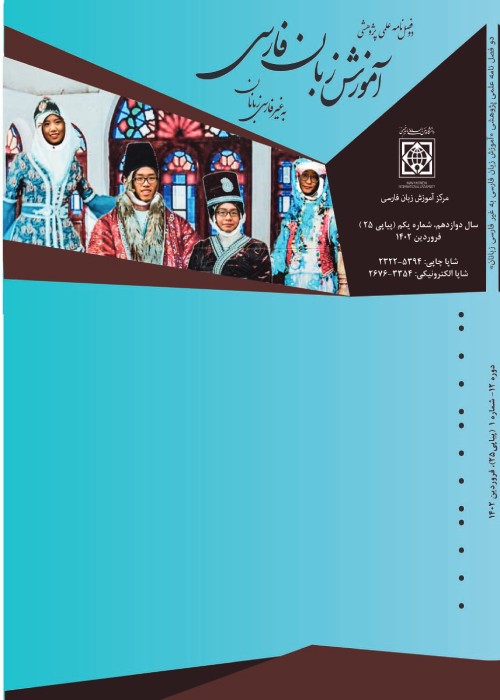A Transcendental Phenomenology of the Solutions for Challenges of Teaching L2 Reading Comprehension in Virtual Classes
With the rise of new technologies in teaching foreign languages, it has become increasingly important to provide comprehensive and fundamental solutions to tackle the challenges of utilizing technology in teaching different language skills, specifically L2 reading comprehension. The objective of this study was to use transcendental phenomenology to investigate the experiences of English language teachers in Iran, and to uncover their effective solutions for addressing the challenges of teaching English reading comprehension in virtual classes. In this research, the experiences of eight English language teachers were examined using the transcendental phenomenology method to deal with the challenges of teaching English language comprehension. The results of analyzing narratives and phenomenological interviews utilizing Giorgi's five-step phenomenological analysis method (Giorgi, 2009) showed two solutions: 1) the importance of embedding new technologies in the growth of educational technology knowledge and 2) the importance of embedding new technologies in strengthening a positive attitude towards the use of technology, which can help to solve the challenges of teaching English reading comprehension in virtual classes. Based on the findings of this study, it can be concluded that the solutions to address the challenges of virtual teaching of English language comprehension are of interest in two structures: superficial and deep. Solutions in the surface structure, such as improving the Internet speed, may only address the challenges for a limited time and in certain environments. However, deep-level solutions that were the focus of this transcendental phenomenological research can solve the challenges more comprehensively due to their multifaceted nature.
The development of technology has significantly improved the teaching and learning process in today's society. Technology's unique features, such as its wide availability, ease of access at different times and places, and high speed, have contributed to its increased use in teaching and learning over the past two decades (Haleem et al., 2022). Given the importance of learning English in today's world, it is essential to use modern technologies to facilitate the teaching and learning process, especially in non-English-speaking countries (Cifuentes, 2022). Therefore, the use of modern technologies to improve teaching methods, tools, content, equipment, and new strategies is crucial to achieving educational goals in the field of English language education (Prayudi et al., 2021).
Since reading comprehension is crucial for the academic progress of English language learners (Smith et al., 2021), using new technologies to teach reading comprehension can increase the participation of English language learners in virtual educational environments, improve their attitudes toward learning, and enhance their academic progress (Noordan et al., 2022). Therefore, the purpose of this research was to use transcendental phenomenology to investigate the experiences of English language teachers in Iran and discover their effective solutions to face the challenges of teaching reading comprehension in virtual environments and classrooms.
The researchers used transcendental phenomenology as a type of qualitative research to achieve the research's purpose of providing fundamental solutions to the challenges of teaching English language comprehension to non-English speakers in virtual environments based on teachers' experiences. This method pays attention to the experiences of teachers and leaves aside the experiences of researchers (Moustakas, 1994). By using transcendental phenomenology, the researchers could inform the participants about the goals of research, based on which they obtained more detailed information about teaching strategies without the challenge of understanding content in the virtual environment, which was based on the semantic description of the investigated phenomenon (Edmonds & Kennedy, 2017). The study included eight teachers of English to non-English speakers who were selected purposefully because they faced challenges with teaching reading comprehension in virtual classes and had provided solutions to overcome those challenges.
The obtained results showed multidimensional solutions from the teachers that could affect the existing challenges in a multifaceted and fundamental way. Based on this, two solutions were identified: 1) the importance of embedding new technologies in the growth of educational technology knowledge and 2) the importance of embedding new technologies in strengthening a positive attitude towards the use of technology. These effective solutions can provide fundamental solutions to the challenges of teaching English comprehension in virtual classes.
The findings of the study showed that the solutions to the challenges of virtual teaching of English language comprehension can be classified into two categories: superficial and deep structures. Superficial solutions, such as increasing internet speed, may solve some challenges for a limited period and in some environments. Still, deep-level solutions, such as the ones identified in this research, can solve challenges more effectively. For instance, by introducing new technologies in educational centers, teachers feel the need to strengthen their technology knowledge and act accordingly. At the same time, their positive attitude towards the use of technology is enhanced, which results from observing the usefulness of virtual education, and not a challenge. Thus, educational decision-makers are advised to make a special contribution to the foundation of new technologies to deal with the challenges of virtual education, particularly the challenges of virtual teaching of English language comprehension. Embedding new technologies in strengthening the positive attitude toward the use of technology and in the growth of educational technology knowledge can create a turning point in virtual education, solving many of the current challenges of virtual teaching by creating educational and implementation strategies.
The authors have no conflict of interest.
We would like to express our gratitude to Imam Khomeini International University for providing financial support for this study.
- حق عضویت دریافتی صرف حمایت از نشریات عضو و نگهداری، تکمیل و توسعه مگیران میشود.
- پرداخت حق اشتراک و دانلود مقالات اجازه بازنشر آن در سایر رسانههای چاپی و دیجیتال را به کاربر نمیدهد.


